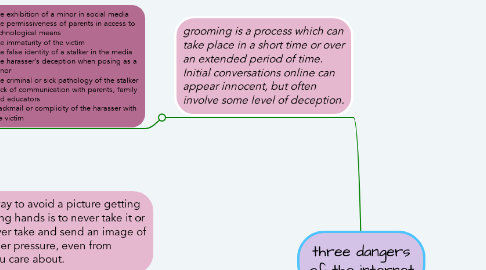three dangers of the internet
저자: crista arias

1. grooming is a process which can take place in a short time or over an extended period of time. Initial conversations online can appear innocent, but often involve some level of deception.
1.1. The exhibition of a minor in social media The permissiveness of parents in access to technological means The immaturity of the victim The false identity of a stalker in the media The harasser's deception when posing as a minor The criminal or sick pathology of the stalker Lack of communication with parents, family and educators Blackmail or complicity of the harasser with the victim
1.1.1. We should never give images, videos or data compromised by the Internet, let alone strangers. It is necessary to have a good computer security in the equipment, keeping it updated and always preserving the confidentiality of the passwords
2. Sexting occurs when a person takes a picture that's nude, seminude, or flirtatious and sends it to another person over the phone.
2.1. The safest way to avoid a picture getting into the wrong hands is to never take it or share it. Never take and send an image of yourself under pressure, even from someone you care about.
2.2. In some cases it’s a form of flirting or a way of showing affection for a boyfriend or girlfriend or someone the teen is interested in dating. Sometimes it’s impulsive behavior, perhaps at a party or when under the influence of drugs or alcohol. There are also cases where the teen is responding to peer pressure, bullying or even threats. In rarer cases, adults solicit images from teens. Some teens view sexting as a form of “safe sex” because, unlike physical sex, there is no risk of pregnancy or sexually transmitted diseases.
3. Cyberbullying includes sending hateful messages or even death threats to children, spreading lies about them online, making nasty comments on their social networking profiles, or creating a website to bash their looks or reputation.
3.1. Talk to your child about responsible online behaviour Remind them that once a message is sent or a comment is posted online you cannot take it back. Let them know that if something bothers them, makes them feel upset, sad or scared they can talk to you about it.
3.2. IGNORANCE: Because of boredom they start humiliating someone to create some entertainment in their life. SED OF POWER: It is normal to want to have control of everything and to believe knowing everything we do when we do not really know half of what we do (in most cases). So in order to feel powerful they usually use discrimination in order to feel superior to others. VENGANZA: This cause is one of the most worrisome. It is not an unconscious action because it is done on purpose. Usually those who do this are nerds or marginalized because they think it is the one solution to their problems. ANONYMATE: This is also considered one of the most important factors because the aggressor makes it very easy to send a "hate mail" or a "hate message" to the victim for being protected by anonymity.


